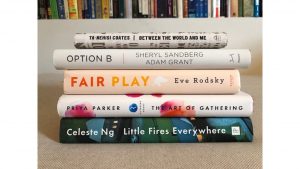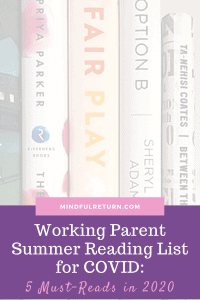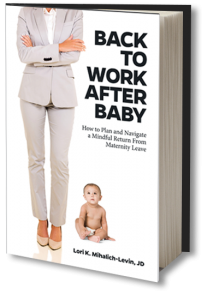Wondering what books should be on your working parent summer reading list during COVID?
No, probably not! (Ha ha.) If you’re a working  parent these days, I suspect you haven’t had much bandwidth for reading books lately.
parent these days, I suspect you haven’t had much bandwidth for reading books lately.
Nevertheless, I welcome you to Mindful Return’s 5th annual summer book list. In the event you can even squeeze in a few pages a week, here are my recommendations for where to start.
I’ve been reading a little bit in the evenings these days and also some on weekends, when I get my 3 hours of “alone time” on Saturdays. (My husband and I swap this experience for one another, and he gets 3 hours of “alone time” on Sundays…)
This list reflects the moment we are in. COVID. Anti-racism. Household division of labor. A need for connection. And a need to grow our empathy muscles by reading fiction. (Turns out research shows that people who read more fiction are better at empathy and at understanding others.)
I’m still a big fan of all the books I’ve recommended in my first four summer reading lists, which you can find here:
- 2019 Working Mama Summer Reading List: 5 Fabulous Books
- 2018 Working Mama Summer Book List: My 6 Faves from the Past Year
- A Working Mama’s 2017 Summer Reading List: 6 Inspiring Reads
- A Working Mama’s Summer Reading List: 6 Picks to Fill You Up (2016)
And now, onto the list! As always, if you’re a new or newish working mama, I hope you’ll check out my own book, Back to Work After Baby: How to Plan and Navigate a Mindful Return from Maternity Leave.
2020 Working Parent Summer Reading List
Option B: Facing Adversity, Building Resilience, and Finding Joy, by Sheryl Sandberg and Adam Grant
- Why read it? Is anything we’re doing right now our Option A? Whether it’s how I’m working, parenting, or living in general, nothing is my first choice right now. The title sums up why this is the perfect book to reading during COVID. Facing adversity? Need to build resilience? Check. Trying to find joy? Check. For those who don’t know, this is the book Sheryl Sandberg wrote with Adam Grant after her husband, Dave, died suddenly on a treadmill. We all need these coping strategies.
- Favorite Quote? “I now know that it’s possible not just to bounce back but to grow. Would I trade this growth to have Dave back? Of course. No one would ever choose to grow this way. But it happens—and we do. As Allen Rucker wrote about his paralysis, “I won’t make your skin crawl by saying it’s a ‘blessing in disguise.’ It’s not a blessing and there is no disguise. But there are things to be gained and things to be lost, and on certain days, I’m not sure that the gains are not as great as, or even greater than, the inevitable losses.’”
Between the World and Me, by Ta-Nehisi Coates
- Why read it? Because we (I’ll speak for white people here) need to do more to open our eyes to our country’s racist foundations and institutions. This book is written as a letter – from Coates as a father, to his 15 year old black son. It is both poignant and devastating. We can all relate to the idea of struggling with what exactly to impart to our children about our own past. But those of us who benefit from white privilege can’t relate to having to teach our children how fragile their lives are because of racism.
- Favorite Quote? “I did not want to raise you in fear or false memory. I did not want you forced to mask your joys and bind your eyes. What I wanted for you was to grow into consciousness. I resolved to hide nothing from you. Do you remember when I first took you to work, when you were thirteen? I was going to see the mother of a dead black boy…Then the mother of the murdered boy rose, turned to you, and said, ‘You exist. You matter. You have value. You have every right to wear your hoodie, to play your music as loud as you want. You have every right to be you. And no one should deter you from being you. You have to be you. And you can never be afraid to be you.’ I was glad she said this. I have tried to say the same to you, and if I have not said it with the same direction and clarity, I confess that it is because I am afraid.”

Fair Play: A Game-Changing Solution for When You Have Too Much to Do (and More Life to Live), by Eve Rodsky
- Why read it? If household division of labor was a challenging issue pre-COVID, it’s a scalding red hot button issue now. I am truly terrified that any and all gains women have made in the workplace are being erased month after month, as we continue on without childcare…and in many households, women are assuming the lion’s share of household and caregiving work. Though I admittedly wasn’t always a fan of the writing (and wasn’t so into the card game component), I am a huge fan of author’s message that it’s about time we started to recognize that “all time is created equal.”
- Favorite Quote? There are a few I’m particularly fond of. Let’s start with “Only when you believe that your time should be measured equally will the division of labor shift toward parity in your relationship.” And then there’s: “When I went back to work full-time after our second child was born, I took it as my responsibility to make my return to the office a seamless event for our family. I alone arranged for extra childcare at home and modified my schedule so that I could wrap up my work meetings and arrive home just after five.…Looking back on this now, was I nuts? Why didn’t I ask for some help? I mean, he was just as responsible for the creation of these children as I was.” And finally, a great reminder that “only one person has to initiate change to proactively change the entire system.”
The Art of Gathering: How We Meet and Why It Matters, by Priya Parker
- Why read it? You might be wondering why I have book on “gathering” on this list in a year when we’re not supposed to be, well, gathering. Yes, the book was written with in-person experiences in mind, but its principles are relevant no matter how we gather. (And gather, we still do, albeit via media most of us are sick of at this point.) The chapter titles provide a glimpse into the path Parker leads us down in planning gatherings – titles like: “Decide why you’re really gathering,” “Don’t be a chill host,” “Never start a funeral with logistics,” and “Accept that there is an end.” If you’re looking for the author’s COVID-specific advice on planning meaningful gatherings, check out her newsletter and her New York Times podcast, Together Apart.
- Favorite Quote? “I once visited a teahouse in Kyoto, Japan, where I participated in a traditional Japanese tea ceremony to learn from their wisdom on gatherings. The tea master there told me of a phrase the sixteenth-century Japanese tea master Sen no Rikyu taught his students to keep in the front of their minds as they conduct the ceremony: Ichi-go ichi-e. The master told me it roughly translates to ‘one meeting, one moment in your life that will never happen again.’ She explained further: ‘We could meet again, but you have to praise this moment because in one year, we’ll have a new experience, and we will be different people and will be bringing new experiences with us, because we are also changed.’ Each gathering is ichi-go ichi-e.”
Little Fires Everywhere, by Celeste Ng
- Why read it? As I mentioned above, reading fiction grows our empathy muscles. And particularly right now, it can feel SO good to get lost in a story that’s not related to our own struggles. In addition to being an amazingly-crafted story, this novel is so spot-on in describing so many of the strong feelings we have in parenthood (and motherhood, in particular). I chose this book for my list before learning that it’s been turned into a mini-series on Hulu. And I look forward to watching that at some point. I also just listened to Ng’s interview with Brené Brown on Brown’s podcast, Unlocking Us and loved hearing how she created this story.
- Favorite Quote? “Parents, she thought, learned to survive touching their children less and less. As a baby Pearl had clung to her; she’d worn Pearl in a sling because whenever she’d set her down, Pearl would cry. There’d scarcely been a moment in the day when they had not been pressed together. As she got older, Pearl would still cling to her mother’s leg, then her waist, then her hand, as if there was something in her mother she needed to absorb through the skin. Even when she had her own bed, she would often crawl into Mia’s in the middle of the night and burrow under the old patchwork quilt, and in the morning they would wake up tangled, Mia’s arm pinned beneath Pearl’s head, or Pearl’s legs thrown across Mia’s belly. Now, as a teenager, Pearl’s caresses had become rare—a peck on the cheek, a one-armed, half-hearted hug—and all the more precious because of that. It was the way of things, Mia thought to herself, but how hard it was. The occasional embrace, a head leaned for just a moment on your shoulder, when what you really wanted more than anything was to press them to you and hold them so tight you fused together and could never be taken apart. It was like training yourself to live on the smell of an apple alone, when what you really wanted was to devour it, to sink your teeth into it and consume it, seeds, core, and all.”
Have YOU read anything recently that has helped you with life as a working parent (particularly during COVID)? If so, please let us know in comments below! Happy summer reading!
Want more practical tips on working parenthood? Check out my book, Back to Work After Baby: How to Plan and Navigate a Mindful Return from Maternity Leave


